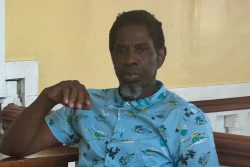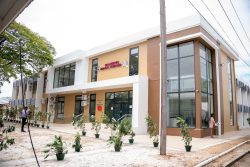What Venezuela has done is so preposterous that had it occurred in the old countries of Western Europe, say, it would have provoked an outcry from democratic nations across the continent and beyond. But not only is Guyana a small and still relatively unfamiliar country on the world map, governments and international news agencies are also distracted at the moment: Gaza, Haiti, Ukraine, Sudan, and since Friday, a major terrorist attack in Moscow have all commandeered the airwaves and column inches. So when on Thursday the National Assembly in Caracas passed a law declaring Essequibo to be a constituent part of Venezuela, the news was lost amid the litany of global catastrophes.
The law creates the state of ‘Guayana Esequiba’ and according to the Venezuelan press it will be ruled by a governor appointed following an election process. For the time being President Maduro will appoint an official to administer the area, which, it might be noted, he had already done. The new state’s capital will be Tumeremo ad interim, (this too had already been announced last year), and will continue as such until Venezuela “reaches a practical and mutually acceptable solution with Guyana” over the territory.
Among its other 22 articles, the law includes one which states that elected officials in the new state cannot be citizens who have behaved in a way which directly or indirectly favours Guy-ana’s position to the detriment of Venezuela’s claims. One can only think that this prohibition would apply to almost the entire, if not the entire current population of the county of Essequibo.
The law unsurprisingly declares the nullity of the Arbitration Award of 1899, but has some additional revealing provisions, such as fines of up to US$10,823 for those who refuse to provide the Venezuelan state with information regarded as necessary for the “defence” of ‘Guayana Esequiba’. Then there is a fine of US$108,611 for anyone publishing or distributing maps that do not show Essequibo as an integral part of Venezuelan territory.
The undeniable arrogance of the deputies who passed the law finds direct expression in the text, which includes the statement: “Standing with its historical dignity intact, Venezuela celebrates the approval by the National Assembly of the Law for the Defence of Guayana Esequiba. Venezue-lan men and women will never renounce our legitimate rights over the Guayana Esequiba territory. This is what we expressed in the consultative referendum of December 3. Venezuela’s sun rises in Essequibo!”
The Guyana government issued a reasoned diplomatic response to this delusional illegality, but unfortunately reason is not an attribute to which the government of President Nicolás Maduro can lay claim, so it never attempts to justify its actions at that level. The problem on this side of the Cuyuni is how does one answer irrationality? The territorial claim itself is irrational; the referendum of last December was irrational; and last Thursday’s law is irrational. Even the language used is irrational; after all, how can you talk about the “defence” of a territory which you do not, and have never occupied, let alone owned.
It puzzles Guyanese, who have never had any doubts that Essequibo is part of our 83,000 square miles, how the people next door, who have never lived there in the past 400 years, have become convinced that this is land which was stolen from them by the British, a theft which was confirmed in the 1899 Award – an award, it should be emphasised, that is both fair and eminently defensible. And it is not just the Government of Venezuela which believes irrationally that the nation was despoiled of territory; three generations of the population have been indoctrinated over several decades to believe it.
The Venezuelan tactic both in relation to historical matters as well as current political ones has been to combine outright falsehoods with turning reality on its head. So there is the Government of Guyana quite rightly pointing out that in relation to the new law Venezuela was in breach of the fundamental principles of international law as enshrined in the UN Charter, and had egregiously violated the Order on provisional measures issued by the ICJ in addition to agreements under the Argyle Declaration of December 14 last year.
And Venezuela’s response? As far as President Maduro is concerned earlier this month he was quoted as saying: “Guyana can decide how to waste its time, ExxonMobil controls the votes of the International Court of Justice and Venezuela will continue not to recognize the International Court of Justice.” At a later point he said that Venezuela did not recognise the jurisdiction of the ICJ, because it was a body which was “in the hands of the global empire of the West.”
As several observers have commented, Caracas is perpetrating the fiction that Guyana is contravening the Geneva Agreement which requires her to come to the table and negotiate directly with Venezuela. It is nonsense; this country’s resort to the ICJ is fully in consonance with the provisions of Geneva. But Miraflores is spreading its fabrication all over the continent.
And as for the Argyle Declaration, Venezuela’s upended narrative is that it is Guyana which is in breach, not Venezuela. Caracas has latched on to remarks made by General Laura Richardson of the US Southern Command, and the visit of a British patrol vessel here. Defence Minister Vadimir Padrino Lopez said: “Acting as an agent of ExxonMobil, SouthCom makes it clear its intention to continue conducting ‘military exercises’ in the Essequibo territory, irresponsibly meddling in a controversy where only Venezuela and Guyana are involved, according to the Geneva Agreement and the commitment assumed in the Argyle Agreements not to involve foreign powers.”
Now they have added the visit here of CIA Director William Burns to the list of spurious breaches of Argyle, and no doubt they will include Mr Bill Clinton and a former British Prime Minister along with the French Foreign Minister when they come. Where Mr Burns is concerned, the government denounced his visit as an “escalation of provocations”. Venezuela knows, of course, that all these diplomatic visits to Georgetown come in response to its actions intended to undermine this country’s territorial integrity. What they will make too of Guy-ana’s membership of the Regional Security System remains to be seen.
The obvious support Guyana is garnering from key western countries is clearly a source of annoyance to Caracas which wants this country diplomatically isolated in order to bully it all the better. The Argyle allegations are intended to force Georgetown to back down, and as such Venezuela will restate its accusations on the next suitable international occasion. Bolivia has already done so on Miraflores’s behalf at the last Celac meeting. The possibility too cannot be ignored that the accusations may also be a back-pocket exit strategy from the Declaration should it be needed.
A further tactic is the denigration of the President and administration of this country, which the Venezuelan executive constantly repeats is not under the control of the people, but of ExxonMobil. Guyana, says Vice President Delcy Rodrigues, “does not govern its country … ExxonMobil [does].” In other words, no one has to take the Government of Guyana seriously because it is not really a government. That is a line which may sell well in left-wing territories on the continent.
In the meantime, as a report from the Centre of International and Strategic Studies demonstrated, Venezuela continues its military build-up on Ankoko and nearby areas, while it pursues its bureaucratic measures in Tumeremo and elsewhere for the incorporation of Essequibo. Along with the law and the inflammatory statements from the Venezuelan executive, what is more compelling evidence of a breach of Argyle?
And then there is that curious little story which appeared in the daily Ultimas Noticias, which described the Venezuelan National Guard arresting two men with an illegal firearm and ammunition in “in El Dorado, Sifontes municipality, Guayana Essequiba state.” And if Guyanese are scratching their heads about where this is, it is on the Cuyuni River in Bolívar state – definitely in Venezuela. Does this mean that those parts of Bolívar next to the Cuyuni, like Tumeremo, are being renamed Essequibo?
While Guyana is clearly getting help on the diplomatic front, perhaps there needs to be a much more energetic campaign to promote our case and our story on the South American continent. Other countries there need to be persuaded we have historical right on our side. And the government must not forget the opposition. Foreign Minister Todd really should call a meeting of the Parliamentary Sectoral Committee on Foreign Relations.








